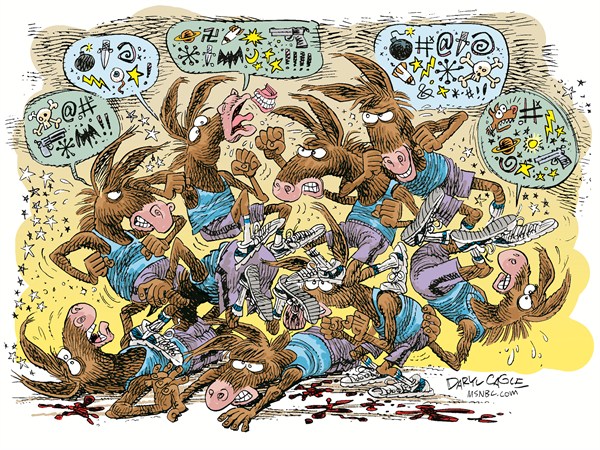
Anyone can campaign on reforming the expensive blight of the U.S. health-care system. But almost no one could have pushed the Affordable Care Act through Congress, given how unpopular it was.
And perhaps only Pelosi could have managed this astounding feat after she'd already exhausted her caucus with so many other pieces of major legislation: the stimulus package, the Wall Street and automaker bailouts, the climate-change bill.
These achievements, to be sure, cost the Democratic Party its House majority in 2010. And so what? Unlike her Republican counterparts, Pelosi understands that a congressional majority should be used to pass legislation, not stuck on a shelf to collect dust like some ornamental trophy.
You might not like the legislation she got passed -- I certainly don't. But just as one can admire a great actor in a terrible play, so Pelosi's detractors ought to credit her ferocious skill in service of a cause they dislike.
Which is why watching her second turn as speaker has been disconcerting. Pelosi's caucus is near open rebellion, most recently last week over funding the Senate's emergency border aid package. Hard-liners in the party had wanted her to amend it, but Pelosi ultimately capitulated to pressure from her centrist wing, whose districts won't countenance using the misery of migrant children as a negotiating tactic.
Since those districts are vital to maintaining the Democratic majority, Pelosi allowed the bill to come to the floor, giving moderate Democrats an opening to join Republicans in passing it. House progressives went berserk.
It was a stunning -- and increasingly common -- display of party disunity. Is Pelosi past it?
Hardly. She, like everyone, faces political forces beyond her control.
For eight years under Obama, there was a lot of chin-stroking commentary from the left about the GOP's turn to angry obstructionism. Perhaps Fox News and right-wing talk radio had driven them all mad ... perhaps shadowy billionaires were paying them to act that way ... or perhaps the party's long-festering crypto-racism had simply finally burst into the open.
Almost always, these monologues ended by hurling an impassioned J'accuse! at Republican leadership, pundits and wonks: You let this happen. You tolerated -- nay encouraged -- the billionaires, the radio hosts, the crypto-racists. You brought the United States to this point with your shortsighted and self-interested pandering.
The criticism alternately bemused and enraged members of the conservative establishment, who possessed far less power than liberals imagined. Decades of good-government reforms had radically decentralized the political landscape, stripping party and congressional leaders of the tools they'd previously used to keep their fringes in line.
Primary elections, especially, had empowered passionate minorities against the center. Meanwhile, the impassioned minorities were getting bigger, and more passionate, as the United States sorted itself into ever-more politically homogenous, and bitterly partisan, geographic areas. Add in social media, which let politicians bypass the few remaining gatekeepers, and ... hello, President Trump.
These broader trends also affected the left but were temporarily masked by control of the presidency, which tends to make partisans more cheerful and cooperative. Thus, Democrats were able to view Washington's increasing dysfunction as a Republican problem, rather than what it was: an American problem. Or looking at Europe, possibly a global one.
But even at the time, if you looked closely, it was obvious that those forces were also stealthily tearing at the Democratic Party -- the Bernie Sanders campaign against the Democrats' anointed successor being the most obvious example. If you weren't invested in the narrative of Republican exceptionalism, then after Trump, it seemed obvious that Democrats were going to run into similar problems. And, lo, it has come to pass.
Democratic presidential primary candidates and progressive legislators steer ever leftward while center-left pundits and party leaders scream, essentially: You fools, you'll kill us all! With one big difference. While the Republican congressional caucus functionally disintegrated under Obama, unable to do much except pass never-never bills to repeal Obamacare, the Democrats haven't quite fallen to pieces. Yet. For that, credit the political skill of Pelosi, who has managed her difficult situation far better than either Republicans Paul Ryan or John Boehner when they were House speakers and paralyzed by the right-wing Freedom Caucus.
But with all due respect to the master of the House, one must wonder how long she can keep her grip, given the sheer power of the forces that want to break it.
Every weekday JewishWorldReview.com publishes what many in the media and Washington consider "must-reading". Sign up for the daily JWR update. It's free. Just click here.
(COMMENT, BELOW)
Megan McArdle is a Washington Post columnist who writes on economics, business and public policy. She is the author of "The Up Side of Down." McArdle previously wrote for Newsweek-the Daily Beast, Bloomberg View,the Atlantic and the Economist.


 Contact The Editor
Contact The Editor
 Articles By This Author
Articles By This Author